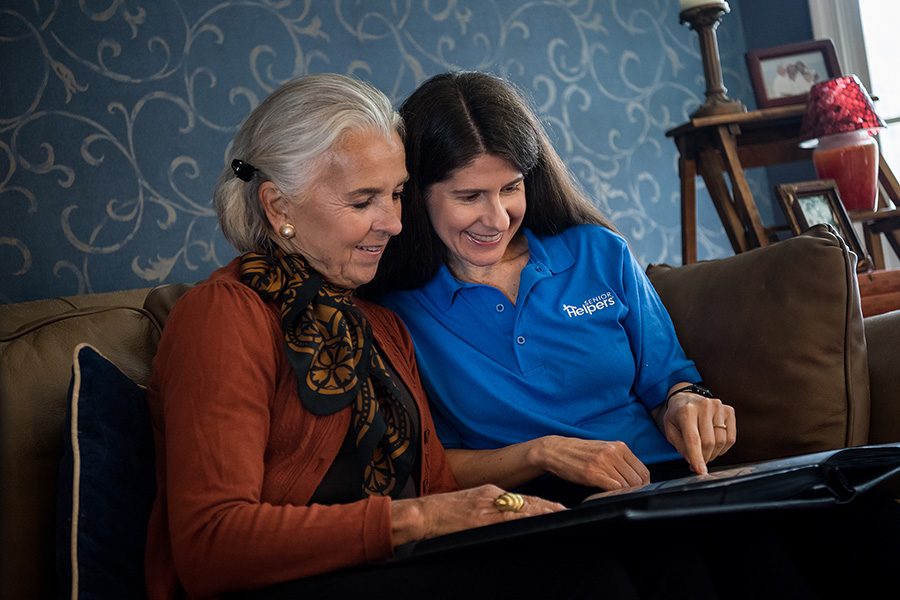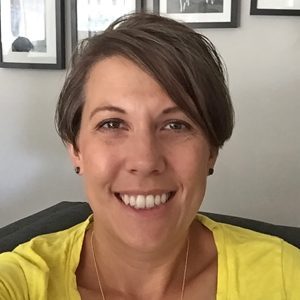
Home » Richland business leans on AI, tech to keep seniors in their own homes
An AI assist for seniors
Richland business leans on AI, tech to keep seniors in their own homes

A Richland home health company uses new technology and methods to keep the aging population safe and independent.
Courtesy Senior HelpersJanuary 16, 2025
A company that aims to support aging at home is now using artificial intelligence and other tools to stay “upstream” of issues that may crop up, helping seniors stay independent longer.
“We’ve decided to make a little bit of a turn,” said Mandy McCollum, a registered nurse who owns a local Senior Helpers franchise based in Richland’s Parkway. “Our goal is that if we could support our seniors earlier, maybe before they even think they really need help, with tasks like making the bed before they fall and break their hip when they’re making the bed. Or, they’re having trouble with walking the dog, let us come in and walk the dog or do meal prep.”
The new program is called “flexHOME,” and allows clients to buy increments of seven minutes of time, giving them the opportunity to get help without traditional in-home care.
“We can just have someone swing by to confirm they’re alive and have a glass of water next to them,” said McCollum.
McCollum founded Senior Helpers of Tri-Cities and Southeast Washington in 2021, and her franchise offers a wide range of care but especially focuses on supporting patients with neurological disorders affecting memory and thinking.
“As a nurse, I knew I could take on heavy care clients, but we have a lot of agencies doing that,” she said. “So, we decided early on to focus on Alzheimer’s and dementia to support families and help them through this long journey.”
Tech assistance
Senior Helpers uses tools like motion sensors that operate without a camera or microphone but are promoted to let family members “effortlessly check in on your senior loved one without invading their privacy.”
McCollum’s company said by using these smart sensors, AI can analyze behavior patterns or routines and send an alert when there’s a deviation, including a lack of activity that may indicate a fall or something more serious.
“When we’re not able to be in the home, how can we pick up trends? Data helps us find exactly what it is you need,” McCollum said. “Some of that technology could be used before they start care to help us develop a care plan to know exactly what mom needs. Is she up all night or is she just up during the day, so we don’t need to worry about it? Traditionally, we dealt with that by starting 24-hour care. Well, 24-hour care is expensive. Not everybody can do that. So, we could put (an AI) unit in your house for $99 a month and let’s gather information first to see what mom needs.”
Senior Helpers also uses data collection to help determine if caregivers are being used at the most optimal times. “Can we change the care plan if we know money is a factor? Can we streamline our caregivers a little bit and best use the funds that we have?” McCollum explained.
They also will come in to assess a home and make sure it’s a safe environment for an aging adult.
“Safety assessments help us with predictability for hospital readmission based on safety factors. We utilize that for all our clients, and we go through 144 safety features at home, and including the (Department of Motor Vehicles), when it’s needed,” she said.
Between technology, data analysis and seven-minute increments of help, this idea of getting ahead of aging challenges with preventative, proactive care is intended to improve the quality of life for seniors.
“Let us do small tasks and as you need more help, we can grow with you,” she said. “You don’t need that all up front right away. Most of us know that after you fall and break the hip is when we first get called, or a family comes and visits, and they’re concerned about their loved one because they’ve seen a significant change from the last visit. That’s when we get calls, but that’s after something’s happened and then now it’s a skilled nursing home or rehab.”
Respite care
McCollum said assistance on the front end doesn’t just benefit the senior, but also the caregiver.
“For those helping their parents with Alzheimer’s and dementia, we can provide a lot more support and education by giving them respite care earlier in the journey, so that they’re not waiting to call us when they’re burned out,” she said.
Respite care is also the idea behind a new facility McCollum is opening soon in Kennewick called Town Square. It will offer reminiscence therapy in a setting designed to look like life in the 1950s, providing comfort for patients with dementia by harkening back to a time they made most of their memories.
Town Square is targeted to open in April on North Edison Street across from Kamiakin High School. Clients will have the option of spending a half day or full day at the location, up to five days a week.
“They come for the day and then go home,” McCollum said. “For me, Town Square was solving a problem that was twofold. One, reminiscence therapy helps with behaviors and things with Alzheimer’s and dementia by helping them have a better quality of life. And two, all those family members who have to stop working, now they have an option. They can go back to work and start balancing their life a bit more knowing mom or dad is going to be at a fun place they enjoy.”
Return Home program
Senior Helpers offers a wide range of services besides Alzheimer’s and dementia care, including care for Parkinson’s and other chronic diseases, as well as companion, personal and end-of-life care. Its Return Home program is brand new.
“We partner with the skilled nursing facility or hospital to provide case management and help with their concerns when they discharge somebody. They’re always worried someone is going to come back to the hospital. We make sure their medications are picked up, they get food and know how to take that medication. We just had a gentleman discharged from the hospital on a Wednesday and I ran out there Thursday. Before I got there, he had taken the wrong insulin.”
The man was OK, but the Return Home program aims to prevent instances like that. “Our goal is to have even more specialized programs,” McCollum said. “For urinary tract infections, wound care, diabetes, to really support hospitals in their discharges.”
Senior Helpers employs about 50 people, not including the staff planned for Town Square. The flexHOME model could potentially double the ratio of clients to caregivers so that more people could be seen in a single day.
“There’s a lot of in-home care companies. I don’t want to be another in-home care company. I want to find a solution to a different problem. We’re kind of always chasing our tail, going uphill, and when people go back to the hospital, we have to start over. So, 2025 is going to look different for us and for seniors if we start doing more preventive care,” McCollum said.
Senior Helpers: 616 The Parkway, Richland, 509-408-3857, seniorhelpers.com
Latest News Business Profiles Science & Technology
KEYWORDS January 2025
Related Articles
Related Products




